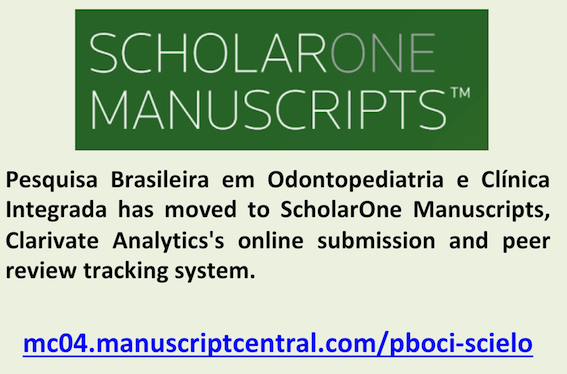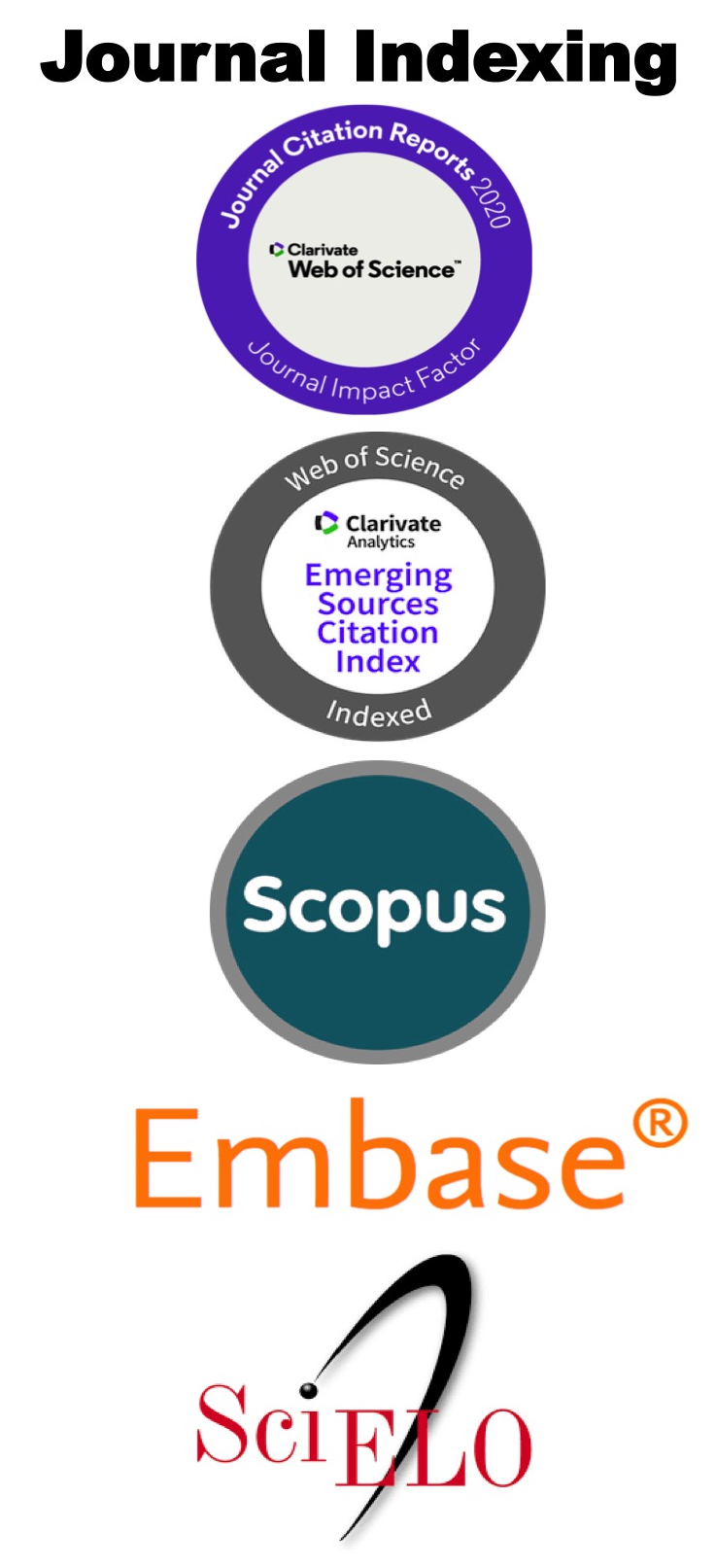Drug Hypersensitivity Associated with Dental Treatments
Keywords:
Drug hypersensitivity, Drug-Related Side Effects and Adverse Reactions, Drug Reactions, Adverse, Dental CareAbstract
Objective: To characterize drug hypersensitivity associated with dental treatments. Material and Methods: Data from 5,302 dental patients extracted from the Faculty of Dental Medicine were used to investigate drug use history, drug hypersensitivity, and associations with oral health outcomes. The chi-square test was used, and values of p ≤ 0.05 were considered statistically significant. Results: The frequency of patients’ self-reported drug hypersensitivity was 26.42% (n = 1,401). The highest frequencies were for opioid/narcotic analgesics (20.84%, n = 292), antibiotics (18.13%, n = 961), and non-steroidal anti-inflammatory drugs (10.46%, n = 141). Most of the patients (68.65%, n = 3,640) reported using medications, mostly for cardiovascular disease (43.1%, n = 1,569), for psychiatric/neurological disorders (39.75%, n = 1,447), drugs that affect the endocrine system (32.55%, n= 1,185), and drugs for pain (24.92%, n = 907). Higher drug hypersensitivity frequencies were associated with older White female subjects (p<0.0001). Associations were also identified between drug hypersensitivity and history of the following dental procedures: tooth extractions (p=0.003), root canal treatment (p=0.0004), prosthodontic treatments (p<0.0001), and orthodontic treatments (p=0.007). Conclusion: A high frequency of self-reported drug hypersensitivity in dental patients was found, with a higher occurrence in older White women and those with a history of more extensive and invasive dental care.References
Dykewicz MS, Lam JK. Drug hypersensitivity reactions. Med Clin North Am 2020; 104(1):109-128. https://doi.org/10.1016/j.mcna.2019.09.003
Kvedariene V, Sitkauskiene B, Tamasauskiene L, Rudzeviciene O, Kasiulevicius V, Nekrosyte G, et al. Prevalence of self-reported drug hypersensitivity reactions among Lithuanian children and adults. Allergol Immunopathol 2019; 47(1):32-37. https://doi.org/10.1016/j.aller.2018.05.006
Rubio M, Bousquet P-J, Gomes E, Romano A, Demoly P. Results of drug hypersensitivity evaluations in a large group of children and adults. Clin Exp Allergy 2012; 42(1):123-130. https://doi.org/10.1111/j.1365-2222.2011.03887.x
Sousa-Pinto B, Fonseca JA, Gomes ER. Frequency of self-reported drug allergy: A systematic review and meta-analysis with meta-regression. Ann Allergy Asthma Immunol 2017;119(4):362-373. https://doi.org/10.1016/j.anai.2017.07.009
Böhm R, Proksch E, Schwarz T, Cascorbi I. Drug hypersensitivity: Diagnosis, genetics, and prevention. Dtsch Arztebl Int 2018; 115(1): 29-30. https://doi.org/10.3238/arztebl.2018.0501
Becker DE Adverse drug reactions in dental practice. Anesth Prog 2014; 61 (1):26-34. https://doi.org/10.2344/0003-3006-61.1.26
Stein K, Farmer J, Singhal S, Marra F, Sutherland S, Quiñonez C. The use and misuse of antibiotics in dentistry: A scoping review. J Am Dent Assoc 2018; 149(10):869-884. https://doi.org/10.1016/10.1016/j.adaj.2018.05.034
Macy E, Poon K-YT. Self-reported antibiotic allergy incidence and prevalence: Age and sex effects. Am J Med 2009; 122(8):778-e1-7. https://doi.org/10.1016/j.amjmed.2009.01.034
Duong TA, Valeyrie-Allanore L, Wolkenstein P, Chosidow O. Severe cutaneous adverse reactions to drugs. Lancet 2017; 390(10106):1996-2011. https://doi.org/10.1016/S0140-6736(16)30378-6
Guvenir H, Misirlioglu ED, Capanoglu M, Buyuktiryaki B, Onay ZR, Ginis T, et al.The frequency of nonsteroidal anti-inflammatory drug hypersensitivity in children with asthma. Int Arch Allergy Immunol 2018; 176(1):26-32. https://doi.org/10.1159/000487305
Khan DA, Banerji A, Bernstein JA, Bilgicer B, Blumenthal K, Castells M, et al. Cephalosporin allergy: Current understanding and future challenges. J Allergy Clin Immunol Pract 2019; 7(7):2105-2114. https://doi.org/10.1016/j.jaip.2019.06.001
Blumenthal KG, Peter JG, Trubiano JA, Phillips EJ. Antibiotic allergy. Lancet 2019; 393(10167):183-198. https://doi.org/10.1016/S0140-6736(18)32218-9
Vardakas KZ, Kalimeris GD, Triarides NA, Falagas ME. An update on adverse drug reactions related to β-Lactam antibiotics. Expert Opin Drug Saf 2018; 17(5):499-508. https://doi.org/10.1080/14740338.2018.1462334
Dibbern Jr DA, Montanaro A. Allergies to sulfonamide antibiotics and sulfur-containing drugs. Allergy Asthma Immunol 2008; 100(2):91-101. https://doi.org/10.1016/S1081-1206(10)60415-2
Sánchez-Borges M, Caballero-Fonseca F, Capriles-Hulett A, González-Aveledo L. Hypersensitivity reactions to nonsteroidal anti-inflammatory drugs: An update. Pharmaceuticals 2010; 3(1):10-18. https://doi.org/10.3390/ph3010010
Virani SS, Alonso A, Benjamin EJ, Bittencourt MS, Callaway CW, Carson AP, et al. Heart disease and stroke statistics—2020 update: A report from the American Heart Association. Circulation 2020; 141(9):e139-596. https://doi.org/10.1161/CIR.0000000000000757
Hasin DS, Sarvet AL, Meyers JL, Saha TD, Ruan WJ, Stohl M, et al. Epidemiology of adult DSM-5 major depressive disorder and its specifiers in the United States. JAMA Psychiatry 2018; 75(4):336-346. https://doi.org/10.1001/jamapsychiatry.2017.4602
Vadivelu N, Kai AM, Kodumudi V, Sramcik J, Kaye AD. The opioid crisis: A comprehensive overview. Curr Pain and Headache Rep 2018; 22(3):1-6. https://doi.org/10.1007/s11916-018-0670-z
Gomes E, Cardoso MF, Praca F, Gomes L, Mariño E, Demoly P. Self‐reported drug allergy in a general adult Portuguese population. Clin Exp Allergy 2004; 34(10):1597-1601. https://doi.org/10.1111/j.1365-2222.2004.02070.x.
Greil W, Zhang X, Stassen H, Grohmann R, Bridler R, Hasler G, et al. Cutaneous adverse drug reactions to psychotropic drugs and their risk factors – A case-control study. Eur Neuropsychopharmacol 2019; 29(1):111-121. https://doi.org/10.1016/j.euroneuro.2018.10.010
Tharpe N. Adverse drug reactions in women’s health care. J Midwifery Women’s Health 2011; 56(3):205-213. https://doi.org/0.1111/j.1542-2011.2010.00050.x
Nakagawa K, Kajiwara A. Female sex as a risk factor for adverse drug reactions. Nihon Rinsho 2015; 73(4):581-585.
Zucker I, Prendergast BJ. Sex differences in pharmacokinetics predict adverse drug reactions in women. Biol Sex Differ 2020;11(1):1-14. https://doi.org/10.1186/s13293-020-00308-5
Oscanoa TJ, Lizaraso F, Carvajal A. Hospital admissions due to adverse drug reactions in the elderly. A meta-analysis. Eur J Clin Pharmacol 2017; 73(3):759-770. https://doi.org/10.1007/s00228-017-2225-3
Dong MH, Bettencourt R, Barrett-Connor E, Loomba R. Alanine aminotransferase decreases with age: The Rancho Bernardo Study. PloS One 2010; 5(12):e14254. https://doi.org/10.1371/journal.pone.0014254
Waring RH, Harris RM, Mitchell SC. Drug metabolism in the elderly: A multifactorial problem? Maturitas 2017; 100:27-32. https://doi.org/10.1016/j.maturitas.2017.03.004
Downloads
Published
How to Cite
Issue
Section
License
Copyright (c) 2023 Pesquisa Brasileira em Odontopediatria e Clínica Integrada

This work is licensed under a Creative Commons Attribution-NonCommercial 4.0 International License.



